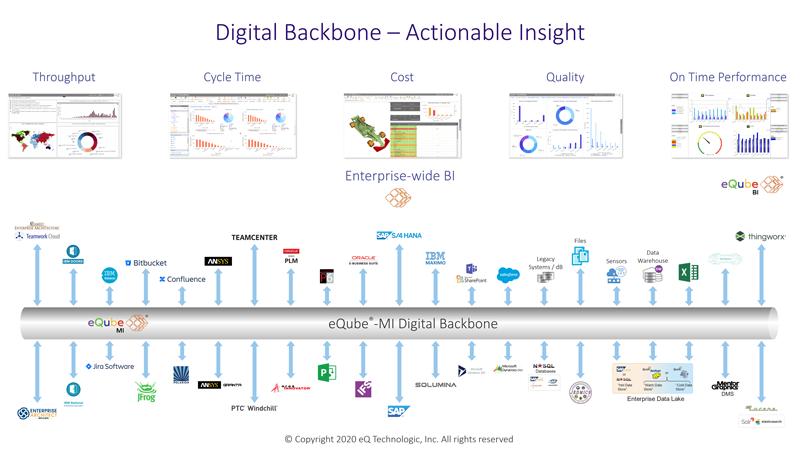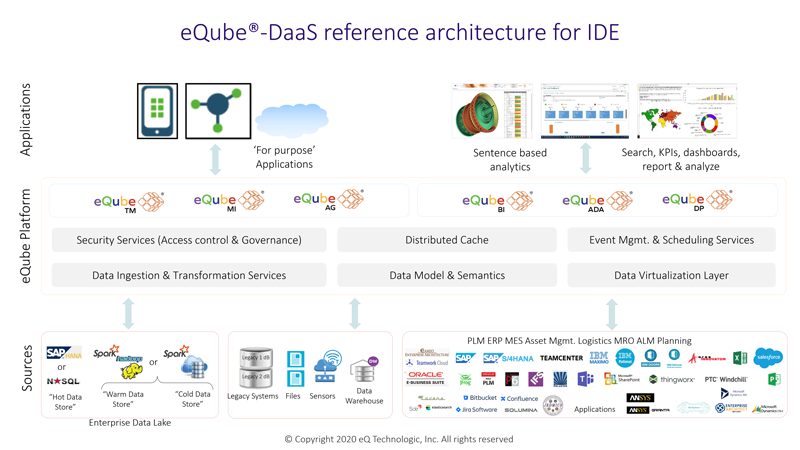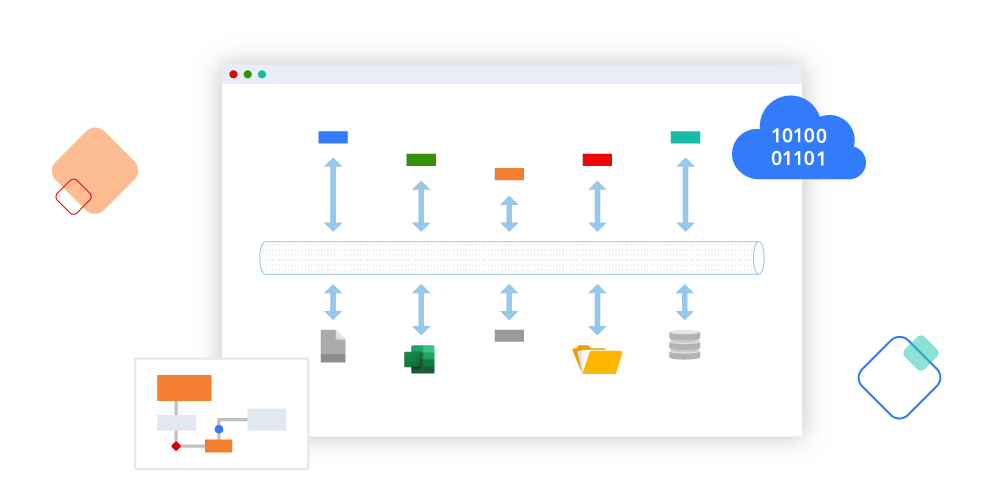eQube®-DaaS Platform

Our platform establishes a Data Fabric with
connected network of integrated data, applications and devices that puts the power of analytics in
the hands of end users leading to Actionable Insight. Data from any source can be aggregated using
eQube's Data Virtualization layer and exposed as a Web service, REST service, OData service or
API.
This rapid and flexible capability to expose data as a service / API is at the heart of efficiently
delivering eQube®-DaaS based solutions in an Integrated Data Environment (IDE).
The platform establishes an enterprise class scalable framework to:
- efficiently and rapidly integrate many legacy systems and new COTS (Commercial off-the-shelf) systems
- responsibly retire legacy systems in an orderly manner without disrupting the business
- rapidly implement intuitive end-user centric 'For-Purpose' applications
- provide on-demand 'visibility' across the business processes with analytics and business intelligence (A / BI) capabilities
More...
eQube®-MI represents 'Not only ESB' integration architecture. Based
on the use case, eQube®-MI can be used to build integration solutions conforming to either
ESB type integration or loosely coupled application-to-application type integration or API gateway type
integration; hence 'Not only ESB'. It has significant advantages over ESBs or message brokers as the
entire integration solution can be rapidly created, extended or updated without having to write
code.
Businesses across industries have organizational goals to dramatically increase productivity, reduce
cost, time to market, and improve quality by embracing Digital Transformation / Digitalization as a
long-term strategy. Productivity is measured in terms of financial performance, increased speed and
throughput in all parts of their businesses, and reduction in NVA (Non-Value-Added) time and efforts.
Leveraging eQube®-DaaS Platform, customers can deliver on the promise of Digitalization or
Digital Transformation of their businesses.
eQube®, establishes a Digital Backbone of integrated data, applications and devices that puts
the power of analytics in the hands of end users leading to Actionable Insight. eQube®-MI
(Digital Backbone) provides a comprehensive and efficient infrastructure for APIs, enterprise
application integration, synchronization, and migration. eQube®-BI, the modern analytics and
business intelligence solution for Actionable Insight puts the power of analytics in the hands of end
users. eQube®-DaaS Platform is flexible, robust, resilient, scalable, and secure with overall
lower total cost of ownership.
Less...
eQube®-DaaS Platform Architecture

This figure depicts a proposed reference architecture for
eQube®-DaaS based IDE.
It shows the eQube®-DaaS Platform connecting with multiple data sources (legacy,
relational and NoSQL databases, sensors, files, COTS applications) to consume and update data in any
format (text files: fixed length and delimited, relational tables, columnar data, NoSQL formats,
binary, objects from applications) and publishing it as APIs (REST or OData services) in end-user
centric 'For-Purpose' Apps.
It also shows eQube®-DaaS Platform aggregating data from multiple sources for
Analytics/BI (A/BI) presented in a cognitive layer for Actionable Insight.
eQube®-DaaS has the following offerings in the market:
The six eQube® offerings broadly fall under two families of offerings: eQube®-MI and eQube®-BI family of products. eQube®-MI family of products is made up of eQube®-MI (Migration and Integration), eQube®-TM (Transformation Modeler), and eQube®-AG (API Gateway). eQube®-BI family of products is made up of eQube®-BI (Business Intelligence and Analytics), eQube®-ADA (Augmented Data Analytics), and eQube®-DP (Data Profiler).
eQube®-MI is a powerful Low / No-code integration platform that establishes a Digital Backbone of integrated applications. It provides a comprehensive and efficient infrastructure for APIs, enterprise application integration, federation, orchestration, synchronization, and migration. In addition, eQube®-MI based application integration infrastructure can be readily extended for secure, scalable, and robust information collaboration across networks, partners, suppliers, and customers that are geographically dispersed. eQube®-MI represents 'Not only ESB' integration architecture. Based on the use case, eQube®-MI can be used to build integration solutions conforming to either ESB type integration or loosely coupled application-to-application type integration or API gateway type integration; hence 'Not only ESB'. It has significant advantages over ESBs or message brokers as the entire integration solution can be rapidly created, extended or updated without having to write code.
A BPMN-compliant (Business Process Model and Notation) Process Designer integrated in eQube®-MI enables visual development of interfaces that include process workflows and processing pipelines containing the integration steps necessary for a given data integration pattern. With the Process Designer, all enterprise integration patterns are supported. Processes can be nested, support transaction boundaries, and include manual steps such as approvals and other forms of human intervention. With the Process Designer, interfaces can be readily developed by visually designing processing pipelines made up of activities, gateways, effects, and paths that capture the business logic of an interface and its process orchestration. The highly configurable eQube®-TM maps are directly consumed in the MI processing pipelines as 'activities', providing flexibility to the developers to rapidly implement APIs (REST, OData or Web services). This capability can be used to build OData or REST service layer on top of one or more enterprise applications (Legacy systems, COTS with old and new versions).
eQube®-TM provides unprecedented capabilities to establish a
catalogue / knowledge base of 'models' and 'transformation maps' for data federation, 'For-Purpose'
Apps, application integration and migration solutions. TM enables developers to visually define,
maintain, and update data transformation 'maps' and solution 'models' between source and destination
data elements (objects, relational dB tables, files, XML, JSON, etc.). TM catalogue stores connected
applications' data models, simple/complex maps and rule-based transformations between systems. The TM
catalogue is discoverable for reusing and re-purposing 'maps' and 'models' that speed up the development
and maintenance of new interfaces and / or new APIs.
TM's sophisticated and intuitive data mapping and rules-based transformation features can support large,
complex data models usually found in engineering and PLM, as well as other industries with complex data
models, such as insurance and telco. Mapping leverages eQube's integrated and powerful data
virtualization layer with semantics. Out of the box ('OOTB'), eQube's sophisticated semantic layer
supports Manufacturing, Finance, and PLM concepts like MBOM, BOP, Structure, Plant, Supplier, Revenue,
Margins, Parts, Changes, eBOM etc. Maps are neutral to input and output data formats as well as lower
level constructs and can support multiple outputs (such as COTS specific object / relationships,
relational database tables, files, SOAP, JSON, etc.) with different data models. Customers have the
flexibility to extend the OOTB semantic model / concepts or create new ones for their businesses.
eQube®-API Gateway efficiently creates, publishes, monitors, maintains and secures APIs. Its visual and intuitive user interface provides complete governance framework for API lifecycle management in any organization. It has flexibility to define security policies at organization level and apply security rules for each API. Monitoring the consumption of APIs is intuitive with in-built BI dashboards that allow administrators to pin-point areas of concern and take rapid action. The API definition capability (REST or OData or Web services) is integrated with TM maps and MI processing pipelines enabling developers to rapidly develop, publish, discover, reuse, and augment (i.e., 'repurpose') APIs. API Gateway accepts and executes API calls and is central for efficient delivery of eQube®-DaaS based solutions.
The powerful combination of eQube®-TM, eQube®-API Gateway, and eQube®-MI provides an integrated Low/No-code development environment for defining, publishing, discovering, reusing and executing OData, REST, Web services, APIs, and interfaces.
eQube®-BI is a modern A/BI platform that Democratizes BI. It puts the power of analytics in the hands of end users. It unshackles end users to analyze live enterprise-wide data on-demand while honoring the security rules of the underlying applications. In addition, it efficiently deals with streaming/sensory data as well as Big Data stores and Data Lakes to provide aggregated view across these data sources and core business systems (PLM, ERP, MRO, Supply Chain, Asset management, Logistics, ALM, etc.) for critical insight. It interactively mashes up data with stunning visualizations to reveal the 'story' behind the data for Actionable Insight. The underlying architecture is enterprise-class scalable architecture with highly optimized in-memory cubes that scales out to support thousands of end users.
eQube®-ADA provides advanced analytics capabilities. It incorporates Machine Learning (ML) and Advanced Statistics techniques for automated data discovery: to identify patterns, clusters, anomalies, textual insights, forecasting, time series decomposition, and text similarity in data. It leverages state-of-the-art ML libraries like scikit-learn, Dask, statsmodels and Spark-ML. In addition, it has innovative Augmented semantic modelling capabilities to auto discover schema and create semantic model based on data. With ADA, analysis pipelines are defined for specific use cases (tasks) that incorporate multiple ML techniques as steps in the pipeline. The task results, made up of trained models and datasets, are consumed using REST APIs across eQube® offerings (MI, BI, and DP).
eQube®-DP assesses data quality, quantity, composition, anomalies, similarities, and patterns. It is instrumental in the data discovery phase in understanding the facets of data and for data curation (i.e., data-prep) for ingestion. Such qualification of data then can be used not only to correct and repair the data, but also as an essential step in establishing transformation rules for application migration and integration. DP leverages ADA and BI capabilities to deliver an integrated solution for data profiling and data curation.
These six eQube® offerings individually and collectively form a flexible, robust, resilient, scalable, and secure framework in delivering eQube®-DaaS based solutions for an Integrated Data Environment at unprecedented speed with overall lower total cost of ownership. eQube®-DaaS Platform's Low / No-code integrated environment results in faster 'time to value' for various integration and migration solutions mitigating the risks of long-duration and expensive IT programs.
